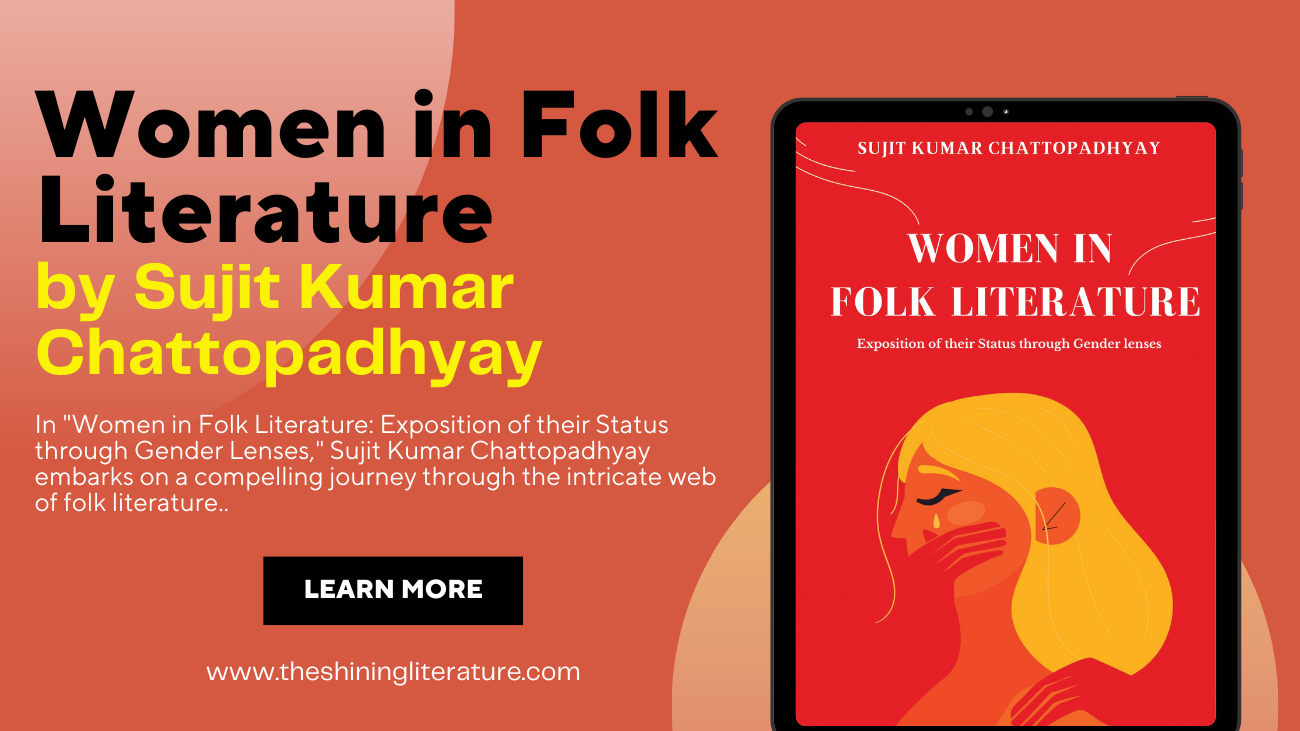Women in Folk Literature unmasks the Hidden Gender Inequality
In “Women in Folk Literature: Exposition of their Status through Gender Lenses,” Sujit Kumar Chattopadhyay embarks on a compelling journey through the intricate web of folk literature, unraveling its profound impact on gender roles and societal norms. In this thought-provoking exposition, the author challenges us to question and critically analyze the hidden layers of cultural narratives that have long perpetuated gender inequality.
Culture’s Dual Nature: Progressive and Regressive Values
The book begins with a bold assertion: culture is a double-edged sword, containing both progressive and regressive values. Chattopadhyay skillfully argues that folk literature, often celebrated for its entertainment value, must be scrutinized for the retrogressive elements it carries, particularly in its depiction of women. With meticulous research and an astute sociological lens, the author delves deep into the heart of folk songs, fairy tales, folk tales, proverbs, and riddles to expose the pervasive gender biases embedded within them.
Unmasking the Subtlety: Gender Inequality in Folk Narratives
One of the book’s standout qualities is its unflinching commitment to addressing the uncomfortable truths of folk literature. Chattopadhyay refuses to shy away from the dark underbelly of these stories and their insidious influence on gender socialization. He argues convincingly that these seemingly innocent tales and rhymes subtly indoctrinate readers and listeners into accepting prescribed notions of masculinity and femininity.
Culture and Society: A Symbiotic Relationship
Throughout the book, Chattopadhyay highlights the interconnectedness of culture and society. He stresses the importance of recognizing and understanding the retrogressive features of folk literature, as they contribute to the perpetuation of harmful gender stereotypes. By doing so, he urges us to engage in a collective effort to deconstruct these narratives and, in turn, reshape societal norms.
A Well-Structured Exploration
The book’s structure is well-organized, with each section meticulously researched and logically presented. Chattopadhyay’s writing is clear and accessible, making complex sociological concepts comprehensible to a wide readership. Moreover, his commitment to shedding light on the overlooked aspects of folk literature is commendable, offering a refreshing perspective in a field often dominated by superficial analysis.
Conclusion: Shaping Culture to Reshape Society
“Women in Folk Literature” challenges us to question the narratives we consume and propagate, encouraging us to view folk literature through a critical gender lens. Chattopadhyay’s extensive research, unwavering dedication, and insightful analysis make this book an essential read for anyone interested in gender studies, cultural critique, or folklore. It serves as a compelling reminder that, as culture shapes society, it is our responsibility to shape culture in return. This book is an eye-opening exploration of how cultural narratives can either perpetuate or dismantle gender inequality, making it a vital addition to the discourse on gender and culture.
Book Title: Women in Folk Literature: Exposition of their Status through Gender Lenses
Author: Sujit Kumar Chattopadhyay
Publisher: Literatureslight Publishing
Publication Date: July 21, 2023
Pages: 299
About The Author
Dr. Sujit Kumar Chattopadhyay was Associate Professor and Head of the Department of Political Science (Retd.), BZSMM, Bankura, West Bengal, India. He participated in international seminar held in 2009 in IIC, New Delhi to commemorate the centenary of Hind Swaraj of Mahatma Gandhi. In that seminar he presented an article on the title, ‘Recent Challenges to gender Inequality and Gram-Swaraj Experiments for Sustainable Development: A Case Study of the District of Bankura’.
This paper has been published by Routledge in a book on the title “Swaraj and the Reluctant State” edited by K. B. Saxena in 2020. His published works include the books ‘Revisiting Vivekananda: From Revival to Renaissance’ (2015), Kolkata, Levant books; Gender Inequality, Popular Culture and Resistance in Bankura District, (2016), New Delhi, Primus,; Fighting gender inequality: A Tribute to Nirbhaya (2015)Kolkata, K.P Bagchi & Co; Samajchitre Loksahitya (2017), Kolkata, K P Bagchi & Co; Loksahitye Narir Sthan (2017)), Kolkata, Levant Books; Gender Socialization and the making of gender in the Indian Context (2018), Los Angeles, London, New Delhi, Singapore, Washington DC, Melbourne, Sage; Image of Women in Proverb: A cross-cultural analysis, Kolkata, Levant Books, 2020; The Eclipse of Democracy, Bilaspur, Evincepub Publishing, 2021; Democracy Revisited, Bilaspur, Literatures Light Publishing, 2022; Everything with Capitalism is not Bad, Bilaspur, Literatures light Publishing, 2023; Gender Perception in Fairytales and Folktales Around the World, Patna, Blue Hill Publishing, 2023.
The Concept of Leadership and its Relevance in Democracy Today (forthcoming); Revisiting Communism (forthcoming); and the edited volume ‘Politics of Discrimination and Problem of Democratic Governance: issues, experiences and challenges (2009), International Book Trust, Kolkata.




